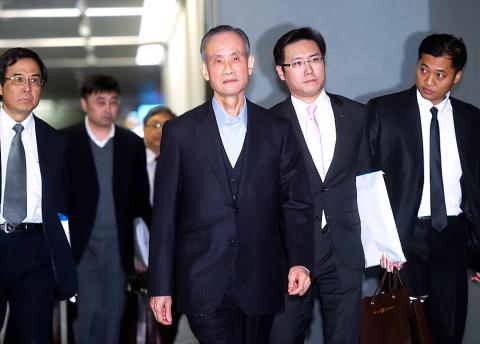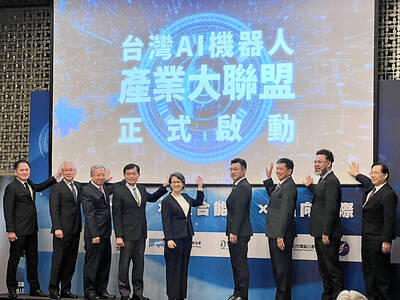The Taipei City Government and the Farglory Land Development Co (遠雄建設) last night agreed to renegotiate the Taipei Dome contract, with Farglory promising to complete construction by end of the year.
Taipei City Government spokesman Sidney Lin (林鶴明) announced the agreement following a one-hour meeting between Taipei Mayor Ko Wen-je (柯文哲) and representatives of the firm on the future of the project.
The Taipei Dome and Farglory’s contract had become a source of controversy in recent days as Ko and his administrative team began looking at several major projects either underway or in the proposal stage.

Photo: Fang Pin-chao, Taipei Times
Prior to last night’s meeting, Ko had said the Dome contract would have to be revised to increase the penalties for failing to meet deadlines. He also said discrepancies between the initial contract terms during the bidding process and the firm’s final contract needed to be discussed.
“Farglory has already gone past the deadline for completing the project, in violation of the contract,” Ko said earlier yesterday, adding that the original contract’s penalty clauses “do not have any real impact,” because they only allow the city government to fine the firm a total of NT$3 million (US$95,300) for violations.
Over the weekend, Ko had called the penalty clauses “ridiculous.”
In addition, while the Control Yuan in 2009 ordered the city to revise 39 questionable articles in the contract for the project, the previous administration did nothing to address the revisions, Ko said before the meeting.
Taipei Dome Project executive secretary Hu Pei-lun (胡培倫) said that while previous negotiations between the city and the firm on revising the questionable articles had led to an initial consensus, the negotiations broke down after Farglory refused to agree to the city’s demands.
In related news, the Department of Rapid Transit Systems yesterday released its plans for unilateral changes to a controversial underground tunnel between the dome and National Sun Yat-sen Memorial Hall.
Ko had previously called the design of tunnel — which was supposed to be used in case the Dome needed to be evacuated — “weird” for requiring pedestrians to pass through narrow passages lined with commercial stall space.
Department of Rapid Transit Systems Commissioner Chou Li-liang (周禮良) said the redesigned tunnel — with the commercial space removed — would meet evacuation needs, while cutting costs substantially and reducing the number of trees which would have to be transplanted.
He said the new tunnel could be constructed in time for the 2017 Universiade.
Farglory executives last week said that revising the tunnel design could prevent the Dome being available for the Games.
Additional reporting by staff writer
This story has been updated since it was originally published.

The paramount chief of a volcanic island in Vanuatu yesterday said that he was “very impressed” by a UN court’s declaration that countries must tackle climate change. Vanuatu spearheaded the legal case at the International Court of Justice in The Hague, Netherlands, which on Wednesday ruled that countries have a duty to protect against the threat of a warming planet. “I’m very impressed,” George Bumseng, the top chief of the Pacific archipelago’s island of Ambrym, told reporters in the capital, Port Vila. “We have been waiting for this decision for a long time because we have been victims of this climate change for

MASSIVE LOSS: If the next recall votes also fail, it would signal that the administration of President William Lai would continue to face strong resistance within the legislature The results of recall votes yesterday dealt a blow to the Democratic Progressive Party’s (DPP) efforts to overturn the opposition-controlled legislature, as all 24 Chinese Nationalist Party (KMT) lawmakers survived the recall bids. Backed by President William Lai’s (賴清德) DPP, civic groups led the recall drive, seeking to remove 31 out of 39 KMT lawmakers from the 113-seat legislature, in which the KMT and the Taiwan People’s Party (TPP) together hold a majority with 62 seats, while the DPP holds 51 seats. The scale of the recall elections was unprecedented, with another seven KMT lawmakers facing similar votes on Aug. 23. For a

Taiwan must invest in artificial intelligence (AI) and robotics to keep abreast of the next technological leap toward automation, Vice President Hsiao Bi-khim (蕭美琴) said at the luanch ceremony of Taiwan AI and Robots Alliance yesterday. The world is on the cusp of a new industrial revolution centered on AI and robotics, which would likely lead to a thorough transformation of human society, she told an event marking the establishment of a national AI and robotics alliance in Taipei. The arrival of the next industrial revolution could be a matter of years, she said. The pace of automation in the global economy can

All 24 lawmakers of the main opposition Chinese Nationalists Party (KMT) on Saturday survived historical nationwide recall elections, ensuring that the KMT along with Taiwan People’s Party (TPP) lawmakers will maintain opposition control of the legislature. Recall votes against all 24 KMT lawmakers as well as Hsinchu Mayor Ann Kao (高虹安) and KMT legislative caucus whip Fu Kun-chi (傅崐萁) failed to pass, according to Central Election Commission (CEC) figures. In only six of the 24 recall votes did the ballots cast in favor of the recall even meet the threshold of 25 percent of eligible voters needed for the recall to pass,